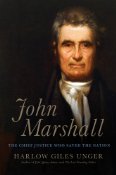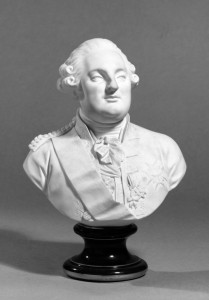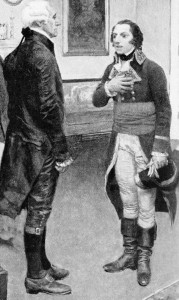
John Marshall by Harlow Giles Unger
 John Marshall
John Marshall
The Chief Justice Who Saved the Nation
By Harlow Giles Unger
Harlow Giles Unger follows John Marshall from his birth in 1755 to his death in 1835, but he does more than that. He shines a bright light on the men we call Founders. As illustrious a group as ever there was, but subject to the same foibles as the rest of the human race. While some faltered and a few, in the grip of ambition or vengeance, veered into intemperance bordering on mental illness, Marshall appears remarkably immune from such failings
According to Unger, and as described by contemporaries, Marshall was tall, good looking, intelligent, possessed of a sense of humor and endowed with a talent for conviviality which would serve him well to persuade his colleagues on the court of his rectitude. He married Polly Ambler in 1783 and was devoted to her. They had 10 children, only 6 of them surviving to become adults. As a result, Polly Marshall suffered from ill health and bouts of depression. Marshall often took time from his busy law practice to comfort her and help with their children. They were married 48 years. When she died in 1831 Marshall was devastated.
In Marshall’s case, Unger is not exactly an objective biographer. His admiration for his subject is evident. Objectivity aside, this reviewer concurs with the author’s judgment, the controversial nature of some of Marshall’s rulings not withstanding.
Unger’s biography is also a fascinating history of the turbulent times in which Marshall lived. If the history that Marshall helped to craft were depicted in a novel, it would strain credulity. America’s adolescence was, for the most part, a chaotic period of political intrigue and personal and political vendettas. But it was also a time when the federal system described in the Constitution was given structure. George Washington, keenly aware that he was setting precedents for the future, established forms and rituals for the executive office still observed today. John Marshall’s contribution to that effort was to make the judiciary co-equal with the legislative and executive branches when Jefferson, during his presidency, tried to emasculate the Supreme Court.  Â
Jefferson does not fare well in Unger’s telling. When Marshall, Aaron Burr, Alexander Hamilton and James Monroe became Revolutionary War heroes, charging enemy lines in New York, Trenton and Monmouth and sharing the bitter winter at Valley Forge with George Washington, Jefferson was not among them.Â
After signing the Declaration of Independence and joining in the collective pledge to sacrifice “ our lives, our fortunes and our sacred honor,†Jefferson “risked none of those assets†and retreated to his Virginia plantation.
 Washington was irate. ‘Where is Mason, Wythe, Jefferson’ the commander-in-chief cried out in anger to his close friend Benjamin Harrison, a delegate in Virginia’s House. ‘They helped write the Declaration Independence, inspired young men across the land to charge into battle, but when they themselves heard the cannons roar, they fled the slaughter they had helped to provoke.’
Fifty-six had signed the Declaration of Independence: nine died in battle, five were captured by the British, and many, such as John Adams*, who didn’t or couldn’t fight, risked death simply by remaining in Congress to raise arms, ammunition, military supplies and money for Washington’s Continental Army.
Except Jefferson! Â
As Governor of Virginia, Jefferson ignored Washington’s strong urgings to replace the men whose enlistments had expired and fortify the mouths of navigable state rivers to prevent British ships from sailing upstream. Jefferson did neither. When Benedict Arnold, now on the British side, sailed his fleet up the James River he was unimpeded by barriers to navigation or an opposing force. The British ravaged the countryside and burned Richmond. Jefferson, “unable or unwilling to mount a defense,†fled once again.Â
Patrick Henry led the Virginia House of Delegates in a motion to impeach Jefferson and call on General Washington to take command of all Virginia forces. Jefferson pleaded with Washington to allow him to finish his almost completed term, pledging that he would retire from public life, “relinquishing [his office] to abler hands.”
After the War
Marshall opened his law practice in Richmond. In several high profile cases, among them winning freedom for illegally enslaved African Indian children, he became widely known as a champion of equal justice under the law.
But the new nation was sinking into unrest. Revolutionary war veterans and small farmers rioted when pressed with crushing taxes enacted by the states to pay for public services formerly provided by the British government. Neither state legislatures nor the Confederation Congress were able to stem the rioting. Adding to the general disorder, the states squabbled over territorial boundaries. Â
It became evident, even to some states-rights advocates, that the only way to halt the spread of anarchy was to strengthen the central government. A convention of state leaders was called to permit Congress to act “with more energy, effect and vigor.â€Â But instead of revising the Articles of Confederation they created a new constitution that strengthened the federal government.Â
For the first time in their lives the three wartime comrades– all members of the elite band of heroic Men of Monmouth– now differed on how to govern their new nation. Marshall and Hamilton, still under the influence of their old commander-in-chief, embraced Washington’s concept of a strong federal government. Monroe had fallen under the spell of his law instructor Thomas Jefferson, who stood with Patrick Henry in espousing state sovereignty in domestic affairs.
Marshall confronted Patrick Henry at the Virginia Ratifying Convention in 1775, successfully arguing against Henry and for ratification. Marshall with other federalists carried the day by just 10 votes. Â
President Washington
When Washington became president he had difficulty recruiting his former comrades-in-arms to serve in his administration. Marshall turned down an appointment to Attorney of the District of Virginia. He had been elected to the Virginia House of delegates and, preoccupied with his law practice, two young children and an ailing wife, he wanted to steer clear of national politics. Â
 With some misgivings Washington appointed Thomas Jefferson Secretary of State because Jefferson’s service under the Confederation Congress made him most able in foreign affairs. But Alexander Hamilton, Washington’s new Secretary of the Treasury and Jefferson had very different ideas about the government they would be helping Washington to shape.Â
With some misgivings Washington appointed Thomas Jefferson Secretary of State because Jefferson’s service under the Confederation Congress made him most able in foreign affairs. But Alexander Hamilton, Washington’s new Secretary of the Treasury and Jefferson had very different ideas about the government they would be helping Washington to shape.Â
Jefferson admired the French Revolution’s vision of society while Hamilton (and Washington) believed anarchy would be the inevitable result. Hamilton and Jefferson heartily disliked each other. “Both sought to influence Washington’s policies; both lusted for power and eyed the Presidency if and when Washington relinquished it.†Hamilton organized supporters under the banner of federalism while Jefferson’s followers espoused state sovereignty calling themselves Republicans or Democrat Republicans. (No connection to present-day Republicans.)
Events in France deteriorated with the public execution by guillotine of the French king, an event that caused Jefferson to all but rejoice.
 “We are not expected to be transported from despotism to liberty in a feather bed,†Jefferson smiled.
Washington was too appalled to comment, but he kept a bust of the French king prominently displayed in his office. Â
The Genet Affair
When France declared war on England in 1793 pressure mounted from Jefferson and others to side with France. Hamilton urged Washington to enter the war on the British side. Washington declared the United States neutral; a decision Jefferson did his best to undermine. Â
 The nation was in an uproar with pro-French sentiments when the French Republic’s new ambassador, Citizen Eduard Genet, sailed into Charleston, South Carolina, determined to force Washington’s hand. In this effort he had Jefferson’s covert and overt support. In a near-treasonous action, Jefferson gave Genet’s confederate Andre Michaux a letter of introduction to Governor Isaac Shelby of Kentucky, implying federal government approval of Genet’s efforts to raise an army in the West. Adding to the turmoil the French fleet sailed into Delaware Bay from the Antilles and French seaman poured into the streets to join the Jacobin mobs.Â
The nation was in an uproar with pro-French sentiments when the French Republic’s new ambassador, Citizen Eduard Genet, sailed into Charleston, South Carolina, determined to force Washington’s hand. In this effort he had Jefferson’s covert and overt support. In a near-treasonous action, Jefferson gave Genet’s confederate Andre Michaux a letter of introduction to Governor Isaac Shelby of Kentucky, implying federal government approval of Genet’s efforts to raise an army in the West. Adding to the turmoil the French fleet sailed into Delaware Bay from the Antilles and French seaman poured into the streets to join the Jacobin mobs.Â
Marshall and Virginia state officials rallied behind the president. Governor Henry “light-Horse-Harry Lee” called up the Virginia militia to defend Norfolk against invasion and appointed John Marshall brigadier general. Genet, meanwhile, arrived in New York to huge crowds and cheers. But within a few days the crowds disappeared and the church bells ceased ringing. Yellow Fever had swept into the city sending all but the very poor fleeing for their lives.
‘The coolest and the finest minds,’ John Adams recalled later, ‘have given their opinions to me that nothing but the Yellow Fever…could have saved the United States from a fatal revolution of government.’
Readers of David McCullough’s book, 1776, may be reminded of his observation of how near a thing victory over the British really was: “… how often circumstance, storms, contrary winds, the oddities or strengths of individual character had made the difference–the outcome seemed little short of a miracle.â€Â
Unger does not get to Marshall’s appointment to the office of Chief Justice by outgoing President John Adams until the second half of his book. The intervening history and Marshall’s involvement in it are too eventful to truncate. Before his Supreme Court appointment, Marshall served his country as officer in the Confederation Army, Congressman, diplomat, and Secretary of State. Â
Failed Peace Mission
As diplomat, Marshall was involved in one of the more dramatic events of the time. He and two other peace commissioners were appointed by President John Adams in July of 1797 to negotiate with the French and prevent a war with that nation. While Adams was working out their instructions, Vice President Jefferson “in what was tantamount to treason†told the French Consul to urge his government “to listen to them and then drag out negotiations to permit the French Navy to intercept American ships bound for England.†French Foreign Minister Talleyrand apparently followed that advice. He refused to see the commissioners and repeatedly sent agents through informal channels to demand loans and bribes as a condition of opening formal negotiations. Marshall replied:Â
…America is a great and …powerful nation…Our national independence…is dearer to us than the friendship of France. America had taken a neutral stance. She had a right to take it. No nation had a right to force us out of it. To lend a sum of money to belligerent power…is to relinquish our neutrality and take part in the war. To lend this money under the lash and coercion of France is…to submit to a foreign government imposed on us by force.
President Adams was furious. Spontaneous anti-French demonstrations broke out across the nation. The Federalists, who controlled the government, used the outrage to build up the nation’s military.Â
As exemplified above, the years before Marshall’s Supreme Court appointment are too absorbing for this reviewer to quibble about having to wait to read about his Supreme Court decisions. Because it is not possible to include more of that history here, this review, as the saying goes, will now “cut to the chase.â€Â
Chief Justice Marshall
On February 4, 1801, forty-five year old John Marshall, having been appointed by outgoing President Adams, took the oath of office as Chief Justice of the US Supreme Court and began what would be an historic and turbulent–thirty-five year tenure in the U.S. Supreme Court.Â
Every hero requires a malevolent adversary and Thomas Jefferson fills that role for Unger. The author’s previous expositions of Jefferson’s character deficiencies are a prelude to the main event.
With the Initial rap of his gavel, Marshall sounded the opening volley in a brutal political war with Thomas Jefferson over the meaning and interpretation of the Constitution–a war that would shape American government, provoke civil war, and determine the nation’s course for centuries to follow. Â
Jefferson, with the help of a Republican Congress, shut down the Supreme Court for two years. “It was a coup d’état that gave the president and his Republican Congress complete control of the federal government.†Jefferson succeeded in voiding Article III of the Constitution and exiled the Supreme Court justices from the national capital for all but two weeks a year. Like his colleagues, Marshall spent his days riding the Circuit. Jefferson removed the federal judges hastily appointed by Adams because their political views differed from his own. “With Jefferson’s Republicans in command of Congress and the Justice of the Supreme Court ‘in exile’ the president wielded all but dictatorial powers.â€Â Â
When Marshall reconvened the Court the first case was Marbury v Madison. The court ruling established a precedent not found in the Constitution when it ruled that the Supreme Court has the power over judicial review to void federal laws as unconstitutional. The court also denied the president authority to remove a federal judge from the bench.
Among subsequent influential rulings Unger chose nine as most consequential and, in the Appendix, explains what they accomplished in three keys areas:Â
establishment of federal sovereignty over the states,
protection of individual rights against arbitrary government actions, and
recognition of the US Supreme Court “as supreme in the exposition of the law of the Constitution.
In all the Marshall Court handed down 1,180 decisions, with Marshall writing 549 of them. Many were controversial at the time and continue to be so.
 In McCullough v. Maryland “the Court asserted a new doctrine of implied powers, saying that the Constitution gave the federal government the right to establish a bank or any other agency not specifically prohibited by the Constitution so long as it was consistent with the letter and spirit of Constitution.â€Â Â
“The decision sharply limited state sovereignty and declared the Constitution the “supreme law of the Land.â€Â
Perhaps this reviewer is not alone in wondering whether Marshall’s efforts to establish the supremacy of the federal government over the fractious states in a still fragile Union did not harbor the rogue seeds now nourished by an administration determine to centralize all power in the federal executive, at the expense of Congress, state governments, and “we the people “
This is an extensively researched biography of a man who is too little remembered today. It’s become a cliché to say that a book reads like a novel, but that doesn’t make it any less true. Unger is a superb writer whose books have often been reviewed on this blog. Each one seems better than the last. We look forward to the next one.  Â
* Unger could have also mentioned that Adams undertook a hazardous Atlantic crossing during the war and showed what he was made of.
 The posts are coming!
The posts are coming!

0 comments
Kick things off by filling out the form below.
Leave a Comment